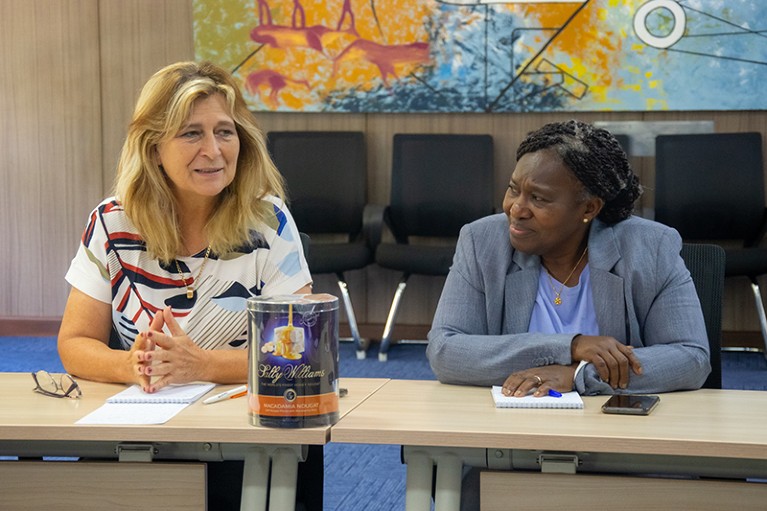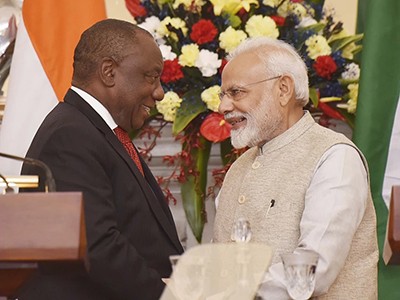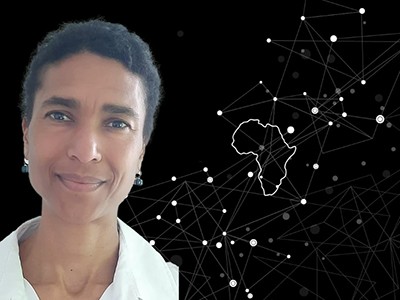
Lise Korsten (left) and Peggy Oti-Boateng are steering the African Academy of Sciences’ new strategy.Credit: AAS Kenya
“We have a renewed mission,” the executive director of the African Academy of Sciences (AAS), Peggy Oti-Boateng, proudly declared at the launch of the academy’s strategic plan on 29 February. “In our previous mission, we were leveraging our resources, but now we want to leverage science, technology and innovation for sustainable development on the continent.” As AAS president Lise Korsten told Nature: “We want to really pitch ourselves as a global academy, representing the voice of African scientists.”
For the AAS, it is an important, welcome and timely step forwards, and hopefully the start of a new chapter in its near 40-year existence.
It comes after a difficult episode in the AAS’s history. The academy, which is based in Nairobi, is a pan-African fellowship society — modelled on many academies around the world. Its founding members included the late Kenyan entomologist Thomas Odhiambo, founding head of the International Centre for Insect Physiology and Ecology, and Sudanese mathematician Mohamed Hassan, formerly president of TWAS, the World Academy of Sciences. Some 30 years after its creation, in 2015, the AAS, the African Union and international funders, including the Bill and Melinda Gates Foundation and the UK biomedical charity Wellcome, agreed that the academy would host and manage a research-funding platform on behalf of these funders.
Researchers back African Union to join G20 group of largest economic powers
The AAS secretariat grew from a body with 19 staff members in 2014 managing a budget of around US$5 million a year, to one with more than 60 staff, distributing more than $250 million per year in health- and biomedical-research grants. In 2021, following internal tensions at the academy and the suspension of a few senior staff members, the funders withdrew, saying that they had lost confidence in the AAS’s governance systems. Much of this played out in public, putting the academy’s reputation at risk.
In fairness, the academy should not have been put in that position in the first place. Scientific academies are not generally set up to function as large-scale funding agencies. Their role tends to be to recognize their country’s researchers through fellowships and awards, represent the interests of science to governments and, where needed, advise policymakers. Part of their strength comes from being a trusted body of experts. This means they should also not align themselves — or be perceived to be aligning themselves — with external organizations. Many AAS fellows had voiced concerns along these lines.
In addition to the latest plan, the academy now has a fresh leadership and governing council. Oti-Boateng, a Ghanaian biochemist who was formerly a science adviser at the United Nations education, science and cultural organization UNESCO, works with Korsten, a South African food-security researcher who is the AAS’s first female president.
The plan is set to run until 2027, and has five areas of focus: environmental and climate change; health and well-being; natural sciences; policy and governance; and social sciences and humanities. Making improvements in these areas is a priority not only for African countries, but also for nations globally.
Looking ahead
This strategy could not have come at a more important time. Last year, the African Union joined the G20, a group of the world’s largest economies. Scientists meet through the S20, a network of G20 scientific academies, to discuss global challenges and also specific issues of concern to the scientific community. Before the African Union joined the G20, South Africa was the continent’s sole official representative in G20 bodies. By contrast, Europe’s researchers have representation from the academies of France, Germany, Italy and the United Kingdom, as well as Academia Europaea, a pan-European academy headquartered in London. The AAS, along with individual countries’ science academies, represented by the Network of African National Academies, is contributing to events leading up to this year’s G20 summit, to be held in July in Rio de Janeiro, Brazil. The meeting agenda includes combating climate change and achieving the UN Sustainable Development Goals.
African Charter to redress funding imbalances
The AAS’s plan also involves attracting scientists in the African diaspora as members. For decades, the continent has haemorrhaged scientists to Europe and North America, and the AAS’s leadership wants to promote researcher and student links between diaspora scientists and colleagues working on the continent. “We have lost a group of young academics who should have now been leaders on the continent, the professors of the future — and maybe we can partially bring them back,” says Korsten. At the same time, broadening the membership should help to strengthen the academy’s finances, which would reduce its reliance on governments and philanthropic donors. The AAS is funded mainly by membership fees paid by its roughly 460 fellows, as well as from the interest from a $5-million endowment fund given to the academy by the Nigerian government in 2001. Other sources include mobility grants from external organizations and money from the European Union African Research Initiative for Scientific Excellence programme, which supports early- and mid-career researchers in dozens of African countries.
The academy has been through some hard times since 2021. It has learnt important lessons and is embarking on an important new phase. All of us who support science in Africa should support the academy, and be a supportive, critical friend to the academy as it strives to achieve its goals.

 Nature Africa
Nature Africa
 African Charter to redress funding imbalances
African Charter to redress funding imbalances
 Researchers back African Union to join G20 group of largest economic powers
Researchers back African Union to join G20 group of largest economic powers
 Thomas Risley Odhiambo (1931–2003)
Thomas Risley Odhiambo (1931–2003)







